Brent Marchant's Blog, page 79
May 19, 2019
‘Hail Satan?’ charts the quest for protecting personal freedoms
“Hail Satan?” (2019). Cast: Interview Footage: Lucien Greaves, Jex Blackmore, Malcolm Jarry, Michael Wiener, Jason Rapert. Archive Footage: Megyn Kelly. Director: Penny Lane. Web site. Trailer.
Advocates for causes may sometimes be surprised where their support comes from. That’s particularly true when such unexpected backing is notably vocal and passionate. So it is for the champions of several high-profile, hot-button initiatives as seen in the snicker-filled new documentary, “Hail Satan?”
Those behind such issues as separation of church and state, women’s reproductive rights, and same-sex marriage often face an uphill battle, especially in light of the zealous, well-organized efforts of right-wing religious fundamentalists. The proponents of these measures can use all of the encouragement they can muster. But who would have thought that they would receive such support from a source like The Satanic Temple.
In “Hail Satan?”, viewers are introduced to a nontheistic “religious” minority that’s nothing like how it has traditionally been portrayed. Through the mainstream media, Hollywood movies and other sources, Satanists have been depicted as evil incarnate hell-bent on engaging in all sorts of horrendous, unnatural, unspeakable acts. Yet, as director Penny Lane’s documentary reveals, these characterizations are largely juvenile exaggerations, the product of a well-orchestrated smear campaign to distort who they really are and what they’re seeking to achieve.
Members of the Temple freely acknowledge themselves as followers of “the opposition.” But this is not meant so much to be opposition to God as much as it is meant to be opposition to those who contend to authoritatively and exclusively speak for the Divine. In that vein, that would include those who intolerantly proclaim their religions to be the sole, unquestionable truth that everyone must follow to the exclusion of all other faiths, schools of theological thought that they dismissively regarded as nothing more than outright heresy. These are notions primarily put forth by fundamentalist Christians, who look upon other religions with disdain and contempt (and, if they feel that way about mainstream creeds, one can only imagine what they have to say about Satanists).

Protesters rally against members of The Satanic Temple seeking to promote religious pluralism as seen in the tongue-in-cheek new documentary, “Hail Satan?” Photo courtesy of Magnolia Pictures.
Temple members, by contrast, maintain that we should all be free to follow whatever faith best suits us, be it Christianity, Judaism, Buddhism, Hinduism or, in their view, Satanism. They believe their mission is to help preserve that right – for everyone – and to steadfastly challenge anyone who would try to take it away. This belief in religious pluralism, they insist, is essential to a society, such as ours, that claims to revere the formal separation of church and state.
In recent years, however, this principle has come under fire, especially when fundamental Christians have undertaken such initiatives as trying to erect Ten Commandments monuments on the grounds of capitol buildings in states like Oklahoma and Arkansas. Members of The Satanic Temple have countered by contending that, if states allow Christian monuments to be placed on public properties, they must also allow the erection of comparable testaments to other religions on those same grounds. To that end, then, Satanists have sought to have statues of their goat-headed god Baphomet installed alongside whatever Christian monuments might be placed on those properties. After all, in a supposedly secular state, fair is fair, they say.
“Hail Satan?” chronicles these efforts, depicting how these outspoken, left-leaning activists have taken on their sanctimonious counterparts and effectively made them look like ridiculous religious blowhards. Instead of patently malevolent deeds, viewers are shown the cleverly crafted campaigns of this band of comically sinister but basically harmless bogeymen gleefully poking holes in the dogma of the religious right. Like impish frat boys pulling pranks, this amusingly macabre contingent of nonconformists has succeeded in capturing public and media attention, deftly outwitting its opposition at virtually every turn.

Satanic Temple co-founder Lucien Greaves (standing at podium) speaks to a crowd of supporters seeking to erect a statue of the goat-headed god Baphomet on the grounds of the Arkansas State Capitol building in director Penny Lane’s “Hail Satan?” Photo courtesy of Magnolia Pictures.
According to Satanic Temple co-founder Lucien Greaves, efforts like the ones his organization are pursuing are crucial to preserve the sweeping freedoms set down in the U.S. Constitution and to prevent their hijacking by those with their own narrow agendas. Speaking from the Temple’s headquarters in Salem, Massachusetts, where a number of innocent women were wrongly put to death for their views in the witch trials of the 1690s, Greaves and his followers believe these efforts need to start with setting the record straight about America’s innate secular nature and religiously neutral legacy. They’re particularly concerned about dispelling the fallacy that the U.S. is a historically “Christian nation.” Indeed, viewers may well be surprised to learn how the promotion of this widely held myth began as a Cold War propaganda ploy to counter the overblown and supposedly insidious spread of “Godless Communism” throughout the land. And, in that regard, audiences will likely be tickled (or possibly shocked) at discovering how the campaign to get Ten Commandments monuments erected on the nation’s municipal properties actually got its start.
However, separation of church and state is but one of the Satanists’ aims. As the film shows, they have also taken on such other faith-based issues as the hypocrisy of religious institutions, most notably the Roman Catholic Church and its cover-up of the actions of pedophile priests (something one won’t find among the ranks of the leaders of The Satanic Temple, they contend). In addition, they have railed against initiatives to institute prayer in school and at government meetings (unless, of course, Satanic verses can be included as part of those programs as well). They have even sought the establishment of after-school Satanic groups in locales where Christians have actively sought to launch Bible studies.

To counter the launching of after-school Bible study groups, Satanic Temple members have sought to establish comparable groups promoting their “religion,” as depicted in director Penny Lane’s snicker-laden documentary, “Hail Satan?” Photo courtesy of Magnolia Pictures.
On a more secular level, Satanists have sought to preserve women’s reproductive protections and to promote gay rights, most notably same-sex marriage. Much of the opposition in these areas also comes from religious organizations, such as the insufferably vocal, supremely homophobic Westboro Baptist Church, which the Temple has unabashedly taken on publicly with devilish glee. The measures implemented by Temple members to counter such protests have been just as satirical, thought-provoking and creative as those used in their other endeavors, all designed to raise awareness about the corruption, hypocrisy and self-serving agendas behind these dubious, reactionary initiatives.
Without a doubt, Satanists have been called “dangerous” for what they do. Yet, if this film is any indication, perhaps the most seditious idea they’re calling for is to think for ourselves. And, if that is indeed a vile, distasteful notion, then perhaps it’s high time for any of us with any common sense to consider moving out of the country. But not if the Satanists have their say; they plan to hold their ground. And, because their ideas seem to speak to a broad number of people, they have become one of the fastest growing religious sects in the country today.
Of course, calling The Satanic Temple a religion may be a bit of a stretch. Most of these ideas are fundamentally social and political in nature, though, for tax purposes, the Temple has had itself legally classified as a religion, something more conventional faiths would probably rail against (even though they often do the same themselves). But this is more proof that Greaves and company can beat the others at their own game and get away with it.
From viewing this film, it would seem that much of what we’ve been taught to believe about Satanists is unfounded, that they’re misunderstood and innocent of what they’ve been accused. The Temple has even taken steps to cultivate this image by issuing guidelines to its various chapters outlining what the faith stands for, an attempt to promote consistency and continuity among its members and leaders in educating the public.
However, as often happens with religious organizations, there are those within them who invariably go rogue, deviating from the institution’s doctrines and principles, and The Satanic Temple is no exception. The documentary reveals this through the Temple’s official severance of ties with its Detroit chapter, led by overzealous advocate Jex Blackmore. She believed that progress for the Satanist agenda was coming too slowly and began advocating actions, such as violence, to speed up the process. Given this violation of the Temple’s tenets, Greaves cut off relations with this chapter, calling it a regrettable but necessary action to preserve the Temple’s image and prevent the public from getting the wrong impression. In that regard, then, it would seem that even Satanists are not immune to the administrative problems that can hamper the missions of religious institutions.

Followers of The Satanic Temple gather on the grounds of the Arkansas State Capitol building in Little Rock seeking the erection of a statue of Baphomet in response to the placing of a Ten Commandments monument in an attempt to promote religious pluralism, as seen in “Hail Satan?” Photo courtesy of Magnolia Pictures.
Nevertheless, despite such issues, it would seem the Temple is doing something right to spur its impressive growth. When organizations like this experience such an expansion in a short period of time, they’re usually espousing ideas that have widespread appeal for a large pool of would-be followers. So, in light of the corrupt, hypocritical state of affairs characterizing many segments of contemporary society, as well as the growing number of individuals who are becoming increasingly intolerant of such conditions, it shouldn’t come as any surprise that the ideas championed by an institution openly opposed to such circumstances would attract the backing of a number of fiercely loyal, dedicated followers.
At bottom, the success behind organizations like this is ultimately driven by the implementation of the beliefs they advocate, and that’s crucial for their growth and popularity, because those notions underlie the origin and sustained materialization of such institutions. That means of manifestation is at the core of the conscious creation process, the philosophy that maintains we realize the existence we experience through the power of our thoughts, beliefs and intents. And, considering the intense passion driving the ideology of The Satanic Temple and the fervor of its members, it’s no wonder that the organization has proliferated as it has.
The Temple’s beliefs have obviously struck a chord with many individuals looking for answers to a litany of social ills that conventional religious and secular institutions either, at best, have been unable to provide or, at worst, have directly caused themselves. Satanism has provided a mechanism through which they can channel their energies, enabling them to push through the limitations that hold them back (and, they would hope, to eradicate the ignorance that binds and blinds the majority of society at large). And, through their inspired attention-grabbing ventures, they seem to be getting some results. Indeed, the opposition has arrived.
In considering the foregoing, some might say they have come up with some novel ways of making valid points. Others, by contrast, might easily call them the latest iteration of the silver-tongued con man. But, when looking at the holier-than-thou spokespersons who definitively claim to speak for the Divine and comparing their supposedly unquestionable evangelizing with their often-questionable public and private acts, one quite legitimately has to wonder who the real charlatans are. (After all, weren’t we warned about false prophets?)
This is not to suggest that everyone should scurry out and join the ranks of the Satanists; that’s a highly personal, individual decision. However, in reading the Temple’s seven basic tenets (see below), one finds principles that are hard to take issue with. If those who lead today’s mainstream religions were to earnestly embrace even half of these notions, the world would be a much better place for it. Let’s hope this film helps to set the record straight about these concepts and those who adhere to them, regardless of whether or not one subsequently opts to become a card-carrying member.

This tongue-in-cheek but thought-provoking look at the efforts of committed but misunderstood activists battling duplicitous religious and political institutions with agendas more dangerous than anything they’re proposing gives us all much to ponder. Amidst the many laughs are telling truths that we should all take seriously if we hope to protect the freedoms we have so diligently sought to carve out for ourselves. Anyone who identifies with the maligned outcasts of society will no doubt relate to the Satanists’ message and realize who it is we should really be afraid of. In relating this story, “Hail Satan?” received a well-earned Sundance Film Festival Documentary Grand Jury Prize nomination.
Recent events have shown us that our rights have fallen into an increasingly precarious position, making their protection ever more important. The need for diligence, even with the backing of unlikely supporters, is crucial to preserve them. Indeed, thinking for ourselves shouldn’t be seen as an unnatural state of affairs but as a wholly mainstream concept that we all enthusiastically embrace – no matter who advocates it.
The Seven Tenets of The Satanic Temple
One should strive to act with compassion and empathy towards all creatures in accordance with reason.
The struggle for justice is an ongoing and necessary pursuit that should prevail over laws and institutions.
One’s body is inviolable, subject to one’s own will alone.
The freedoms of others should be respected, including the freedom to offend. To willfully and unjustly encroach upon the freedoms of another is to forgo your own.
Beliefs should conform to our best scientific understanding of the world. We should take care never to distort scientific facts to fit our beliefs.
People are fallible. If we make a mistake, we should do our best to rectify it and resolve any harm that may have been caused.
Every tenet is a guiding principle designed to inspire nobility in action and thought. The spirit of compassion, wisdom, and justice should always prevail over the written or spoken word.
Copyright © 2019, by Brent Marchant. All rights reserved.
The post ‘Hail Satan?’ charts the quest for protecting personal freedoms appeared first on Brent Marchant.
May 9, 2019
This Week in Movies with Meaning
Reviews of “Dogman” and “On Her Shoulders,” as well as a podcast preview, are all in the latest Movies with Meaning post on the web site of The Good Media Network, available by clicking here.
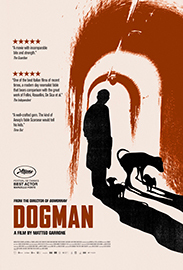



The post This Week in Movies with Meaning appeared first on Brent Marchant.
‘On Her Shoulders’ speaks for those without a voice
“On Her Shoulders” (2018). Cast: Nadia Murad, Murad Ismael, Amal Clooney, Borys Wrzesnewskj, Michelle Rempel, Barack Obama, Ki-moon Ban, Simone Monasebian, Ahmed Khudida Burjus. Director: Alexandria Bombach. Screenplay/Translation: Hishyar Abid, Nawaf Ashur, Deniz Ekici, Yousif Haskan and Shahnaz Osso. Web site. Trailer.
For those without a voice, it’s often difficult to be heard. In those cases, it generally takes someone with the courage and resilience to step up and make the case for them, not the easiest of undertakings. But, when an advocate with the right qualities emerges, incredible results are possible. So it is with an unlikely envoy for a little-known aggrieved people as seen in the stirring documentary, “On Her Shoulders,” available on DVD, Blu-ray Disc and video on demand.
Speaking for refugees whose story has largely gone ignored is difficult enough, but, when the spokesperson is one of those refugees herself, the burden can be a lot to carry. So it has been for Nadia Murad, a passionate advocate for the Yazidi people of northern Iraq, a religious and ethnic minority whose homeland was overrun by attacking ISIS forces in 2014. Through an orchestrated campaign of carnage that included murder, rape and sexual enslavement, the insurgents quickly overran their victims, including a 19-year-old Nadia, who was held captive for three months before escaping. Her ordeal became her cause, which is now told in director Alexandria Bombach’s documentary.

Former ISIS captive Nadia Murad details her painful experiences and those of her fellow Yazidis in the moving documentary, “On Her Shoulders,” available on DVD, Blu-ray Disc and video on demand. Photo courtesy of Oscilloscope Laboratories.
The film follows Murad as she seeks to make the story of her people known to a world that has heard precious little about them and their plight through mainstream media channels and official sources. Through visits to Canada, Germany and Greece, the film documents Nadia’s efforts to inform the public through interviews, personal appearances, and meetings with both refugees and political figures. In addition to increasing awareness about this humanitarian crisis and seeking the attention and support of the United Nations, Nadia’s work also includes tireless efforts to bring war crimes charges against the culprits who plundered her community, an initiative backed by human rights attorney Amal Clooney.
But “On Her Shoulders” is more than just a record of Nadia’s official activities. It also depicts the phenomenal pressure that has been unexpectedly thrust onto a young woman who wanted nothing more than to live a simple life in her homeland. This becomes apparent through her nonstop schedule of events to spread the word and to comfort those who were fortunate enough to flee the tyranny of their attackers. It’s also painfully obvious through the media interviews and hearing testimony that she gives in which she recounts in painful detail – over and over again – the ordeals that she and her people suffered at the hands of her enemies. The film thus reveals an individual of remarkable personal strength and fortitude, as well as a committed and eloquent spokesperson for an oppressed community.
Needless to say, all of this has carried a tremendous cost, both at the time of Nadia’s capture and torture, as well as in her constant reliving of the ordeal in making the case for her people. However, given what’s at stake, she refuses to capitulate to these circumstances, continually striving to promote awareness of the genocide and atrocities inflicted on the Yazidis. This is perhaps best reflected during her address before the U.N. General Assembly in 2016, when she stated, “This world was not only created for you and your families. We also want life, and it’s our right to live it. If beheading, taking women as sex slaves, raping children and the displacement of millions will not move you – when will you move?”

With Yazidi activist Murad Ismael (second from right), former ISIS captive Nadia Murad (left) addresses a crowd in Germany in director Alexandria Bombach’s affecting documentary, “On Her Shoulders.” Photo courtesy of Oscilloscope Laboratories.
Based on the foregoing, it’s easy to see how this unlikely champion of her cause is an embodiment of courage and inspiration. She’s firmly rooted in her convictions, convinced that she must carry through and fulfill her mission. These traits and ambitions are clearly indicative of someone well versed in the practice of conscious creation, the philosophy that maintains we manifest the reality we experience through the power of our thoughts, beliefs and intents. And, regardless of whether or not she’s consciously aware of the existence of this discipline, her actions and efforts nevertheless faithfully reflect its principles.
This is particularly true when it comes to the concept of value fulfillment, the principle that maintains we live out our beliefs to be our best, truest selves for the betterment of ourselves and those around us. Given what Nadia has undertaken, it’s hard to imagine someone more devoted to justice and the well-being of her people. Despite the tremendous personal pain she has suffered, she has carried forward fearlessly with an unshakable faith in her convictions, determined to see things through. We should all be so committed to our endeavors.
Thanks to her efforts, word of the plight of the Yazidis has finally begun to gain recognition. This remarkable young woman should be commended for everything she has accomplished thus far. Let us hope that we don’t let her down now that she’s made her case and gotten our attention.

Speaking to Yazidi refugees in Greece, Nadia Murad (second from right), spokesperson for her displaced people, learns of the experiences of her peers in the stirring documentary “On Her Shoulders,” available on DVD, Blu-ray Disc and video on demand. Photo courtesy of Oscilloscope Laboratories.
This incredibly moving documentary can be a difficult film to watch at times, but its impact is undeniable. One can’t help but feel for the fate of the Yazidis, as well as Nadia’s personal pain, accomplishments attained through Bombach’s masterful direction. The filmmaker genuinely earns our heartfelt emotions without becoming manipulative, maudlin or gratuitously graphic. “On Her Shoulders” is authentically affecting in a way that many other films telling similar stories fail to achieve.
For its efforts, the film received a number of honors and awards, most notably the National Board of Review’s prestigious Freedom of Expression Award. In addition, the picture earned two Independent Spirit Award nominations, including nods for best documentary and the competition’s Truer Than Fiction Award. It also picked up two Sundance Film Festival documentary nominations for best director and the Grand Jury Prize.

It’s truly unfortunate in this day and age that we still need advocates like Nadia Murad. But, as long as we as a species continue to engage in the kinds of atrocities like those committed against the Yazidis, the stories of these horrendous crimes must be told. Thankfully, we’re fortunate to have courageous souls who are unafraid to speak up and make the truth known in hopes that we can keep such horrific episodes from happening again.
Copyright © 2019, by Brent Marchant. All rights reserved.
The post ‘On Her Shoulders’ speaks for those without a voice appeared first on Brent Marchant.
May 7, 2019
‘Dogman’ unleashes one’s wont of personal power
“Dogman” (2018 production, 2019 release). Cast: Marcello Fonte, Edoardo Pesce, Nunzia Schiano, Adamo Dionisi, Alida Baldari Calabria, Laura Pizzirani, Aniello Arena. Director: Matteo Garrone. Screenplay: Ugo Chiti, Matteo Garrone, Massimo Gaudioso, Marco Perfetti, Giulio Troli and Fratelli D’Innocenzo. Story: Ugo Chiti, Matteo Garrone and Massimo Gaudioso. Web site. Trailer.
Few among us would deny the attraction we feel for a sense of personal power. It enables us to direct our destiny and shape the existence we want for ourselves. But it also comes with a temptation, one that can easily get out of hand if left unchecked. And it carries consequences, especially if we misuse it in our dealings with others or our community. It’s an issue that the residents of a neighborhood past its prime wrestle with every day in the tense new dramatic release, “Dogman.”
Life in a rundown Italian seaside community has its residents on the edge, thanks to the relentless crimes, bullying and intimidation of Simoncino (Edoardo Pesce), a former boxer with anger management issues and a serious cocaine habit. He does as he pleases, trashing property, burglarizing homes and businesses, and beating up the vulnerable, including his own mother (Nunzia Schiano), whenever he feels like it. The locals fear him, but they also believe that something has to be done about him, given that authorities do nothing to stop him. It’s like living on the American frontier in the 19th Century, a story that brings new meaning to the term “spaghetti Western.”
It doesn’t help matters that Simoncino has enablers who let him get away with what he wants. Whether they act out of self-preservation or the promise of rewards for their assistance, his shady colleagues quietly help him out when the need calls, often despite publicly condemning his actions. That’s most true of a kindly but weak-willed dog groomer, Marcello (Marcello Fonte), whose conciliatory gestures are mostly intended to keep Simoncino from unduly picking on him. Sometimes Simoncino throws a bone to his coerced cohort, but it’s often paltry and usually less than promised.
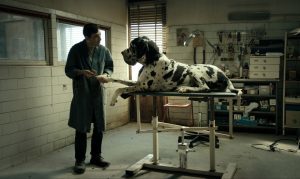
Marcello (Marcello Fonte), a sensitive but weak-willed dog groomer in a rundown Italian seaside community, does his best to carve out a living while fending off the neighborhood bully in the tense new dramatic release, “Dogman.” Photo courtesy of Magnolia Pictures.
Marcello’s willingness to help Simoncino seems puzzlingly out of character. Given how he dotes on his canine clients and lovingly cares for his young daughter, Alida (Alida Baldari Calabria), his readiness to go along with the bully’s schemes come across as wholly anomalous. At times Marcello’s actions appear aimed at quelling the tension. Sometimes they’re efforts to save his own neck. And occasionally he sees opportunities to potentially get something out of these schemes. But, most of the time, his involvement is inexplicable. One can’t help but wonder what he’s thinking.
As time passes, Simoncino’s offenses grow increasingly unpredictable and ever more despicable. Meanwhile, Marcello’s responses become progressively more desperate and humiliating. He even takes the rap for crimes he didn’t commit. And, as all of this plays out, the neighbors are losing their patience with the entire situation. But what can be done? Marcello’s faced with quite the dilemma, but he knows a resolution is desperately needed – and soon.
As much as Simoncino looks to profit materially from his antics, he’s obviously most concerned with the acquisition of power and control over his neighbors and community. He actively asserts himself to amass these commodities, while those around him (particularly Marcello) routinely and willingly hand them over. Understanding that dynamic is thus crucial to appreciate why each of these characters experiences life as they do.

Simoncino (Edoardo Pesce, left), the neighborhood bully in a rundown Italian seaside community, intimidates Marcello (Marcello Fonte, right), a sensitive but weak-willed dog groomer, to get his way in director Matteo Garrone’s latest offering, “Dogman.” Photo courtesy of Magnolia Pictures.
Simoncino succeeds in his efforts because he believes he can get away with them. He envisions what he wants and then makes sure he acquires or develops the means to get it, all of which are products of his thoughts, beliefs and intents. These are the cornerstones of the conscious creation process, the philosophy that maintains we employ these manifesting tools in materializing the reality we experience. The neighborhood bully understands and makes use of the power behind these metaphysical building blocks all too well, even if he’s unaware of the existence of this process or what it’s called.
By contrast, Marcello and the others in his neighborhood cower in fear, believing there’s nothing that can be done about the local nemesis. In embracing that belief, they create a reality based on that notion; they give their power away, leaving them with nothing to defend themselves against someone who wields it so effectively. Thus it should come as no surprise why they’re subjected to such intolerable conditions.
With such circumstances in place, one might think that all is lost, that remediation is impossible. But, given that conscious creation makes any conceivable option attainable, futility need not be inevitable; change is indeed possible. However, it requires an alteration to the manifesting beliefs that are creating these conditions in the first place. Nevertheless, as long as the prevailing thinking is allowed to hold sway, nothing will change; new beliefs must be formulated and implemented to make that happen.
Of course, it takes more than just new beliefs; they must be followed up with action. That means beliefs must be put into place envisioning both the nature of the sought-after change and how it’s to be achieved. For much of the film, that latter consideration seems to be the stumbling block to seeing new possibilities realized. If area residents really want something different for themselves, they must devise plans that get results and go beyond mere wishful thinking.

Marcello Fonte gives an award-winning performance as a sensitive but weak-willed dog groomer in a rundown Italian seaside community in the tense new dramatic release, “Dogman.” Photo courtesy of Magnolia Pictures.
This is where power again comes into play. Marcello and his neighbors must insist on taking it back and putting it to use to attain what they want. The question in this, of course, is, do they possess the personal fortitude to see this through? That means ditching any fear-based beliefs that they cling to, embracing the courage necessary to implement plans for change (and, in this case, change that’s inherently radical, far different from the circumstances to which they’ve grown accustomed).
For the results to be truly meaningful, they must also consider how personal integrity factors into the mix, for it will have tremendous impact on the nature and quality of the results. In Marcello’s case, for example, he’s a sensitive, thoughtful, caring individual, so, if he’s to come up with a plan that sincerely satisfies him, he needs to figure out how he can achieve results without violating his own code of personal conduct. However, that may prove to be a tall order under the circumstances.
Can Marcello indeed make that happen? That remains to be seen. It’s something that will require quite a feat of creativity, one that employs options that may not have been previously contemplated, surpassing the limitations of easy answers that could be construed as personal compromises. Should he resort to convenient fallbacks, he could well end up disappointed with the outcome, one that’s not in line with his standards, disappointingly demonstrating that he’s no better than the foe he’s attempting to vanquish. It’s something we must all heed when faced with situations like this, for the results might easily expose who the real “dogman” is in these circumstances.
I must confess to having a love-hate relationship with this offering. While the film presents an interesting premise that’s well constructed during the first two acts, it seems to paint itself into a corner as it heads toward the conclusion, not quite sure how to wrap up the story. To avoid losing the essence of its central message, the picture regrettably resorts to predictable, conventional means to accomplish this goal, creating something of a letdown in light of the originality depicted at the outset. Sensitive viewers should also be aware that the film features some violent and disturbing sequences. They never get gratuitously out of hand and are generally presented in context, but they’re far from tame, and those who are easily upset by such images should bear this in mind. “Dogman” has been featured at many film festivals and is currently playing in limited release in theaters specializing in independent and foreign film.

Despite its shortcomings, “Dogman” has received its share of accolades. At the 2018 Cannes Film Festival, director Matteo Garrone’s latest earned Fonte the best actor award for his portrayal of the timid dog groomer, a role in which he comes across like an edgy version of a young Jerry Lewis. In addition, the film captured the Festival’s Palm Dog Award in recognition of its outstanding canine cast, as well as a nomination for the Palme d’Or, the event’s highest honor. What’s more, at the BAFTA Awards, the picture picked up a nomination for best foreign language film.
An old adage maintains that “absolute power corrupts absolutely.” Based on the story presented here, it’s easy to see how that can happen, too. But personal power need not become a runaway carriage; it can be tempered and focused into productive pursuits, provided that we make the effort to funnel our beliefs in that direction. And, if we should get off on the wrong path, it’s something we earnestly should consider doing before our lives go to the dogs.
Copyright © 2019, by Brent Marchant. All rights reserved.
The post ‘Dogman’ unleashes one’s wont of personal power appeared first on Brent Marchant.
May 6, 2019
Catch The Cinema Scribe
Tune in for the latest Cinema Scribe segment on Bring Me 2 Life Radio, Tuesday, May 7, at 2 pm ET, available by clicking here. And, if you don’t hear it live, catch it later on demand!


The post Catch The Cinema Scribe appeared first on Brent Marchant.
Symbolism in Cinema
What can symbolism in movies tell us about contemporary society? A lot. Find out more by listening to the latest edition of The CoffeeCast with host Tom Cheevers in which we discuss how movies like “Us,” “Captain Marvel” and “The Shape of Water” symbolically reflect the issues of the day, available by clicking here.

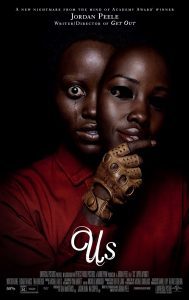


The post Symbolism in Cinema appeared first on Brent Marchant.
April 25, 2019
This Week in Movies with Meaning
Reviews of “Diane,” “Searching” and “The Trouble with You” are all in the latest Movies with Meaning post on the web site of The Good Media Network, available by clicking here.


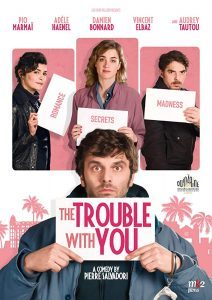

The post This Week in Movies with Meaning appeared first on Brent Marchant.
April 24, 2019
‘Searching’ distinguishes what we know from what we think we know
“Searching” (2018). Cast: John Cho, Debra Messing, Sara Sohn, Michelle La, Joseph Lee, Alex Jayne Go, Megan Liu, Kya Dawn Lau, Ric Sarabia. Director: Aneesh Chaganty, Screenplay: Aneesh Chaganty and Sev Ohanian. Web site. Trailer.
We can take comfort in knowing that certain aspects of our life are exactly as they seem to be. Or can we? Are we getting a clear, accurate picture of the people, places and things that make up our existence? Or are we falling prey to what we’d like to think we know about such elements of our reality? The result can be eye-opening – and disillusioning – as an anguished parent discovers for himself in the sizzling thriller, “Searching,” now available on DVD, Blu-ray disc and video on demand.
When David Kim (John Cho) loses his wife, Pam (Sara Sohn), to lymphoma, he’s devastated by her death. However, with his teenage daughter Margot (Michelle La) to raise, he needs to pull things together to help the adolescent become the talented and successful young woman who has made him and her late mother so proud. He provides a deft mixture of love, support and gentle but firm guidance in hopes that he’ll be able to complete a task on his own that he had so lovingly shared with his deceased beloved.
One evening while Margot is at a study group meeting at a friend’s home, she contacts her dad via video phone to let him know that she’ll be staying late with her classmates. He takes note of her call and, not long thereafter, goes to bed. While David’s asleep, though, Margot apparently phones again, leaving a message to have him call her back. Upon awakening, David gets the message and returns the call only to get Margot’s voicemail – a process that’s repeated several more times with no response. Needless to say, he’s worried.

David methodically tries to track down his daughter’s whereabouts throughout the metropolitan San Jose area. He contacts friends, parents of friends, her piano teacher and others, all to no avail. He learns she didn’t show up for school, a cause for greater concern. He then goes through her computer records, tapping into her email and various web sites to see if he can obtain additional clues about new places to look. But, when those leads continually come up empty, he realizes he needs to contact authorities. He reaches out to the police, who assign Detective Rosemary Vick (Debra Messing) to his case.
Detective Vick takes a strong interest in the investigation, urging David to find out as much as he can about his daughter’s online life in hopes that any new revelations will provide help in solving her disappearance. He agrees and begins probing Margot’s cyber identity in earnest. And what he finds shocks him: Margot, it seems, is nothing at all like he’s thought she is – secretive, a relative loner and someone who has contacts with people he never dreamed she’d associate with.
The discovery overwhelms David, but, as requested by the police, he shares what he finds. Ever the professional, Detective Vick offers whatever official advice she can, but, as a parent herself, she also seeks to provide solace by telling David about her own personal experience with her troubled teenage son, a story not unlike what appears to be unfolding with Margot. David takes some comfort in this, but it doesn’t change the fact that his daughter is still missing.
Together, David and Detective Vick continue to work the process of trying to find the missing teen, an undertaking that grows ever more disturbing and confounding, especially when many seemingly possible leads don’t pan out or turn out to be utterly frustrating red herrings. It’s stressful, too, particularly when some of the revelations involve individuals David never would have suspected as being part of this, such as his brother, Peter (Joseph Lee). Many illusions, it seems, come up for shattering.
To say more would reveal too much about how this picture plays out. However, as the story progresses, David is faced not only with the challenge of finding Margot, but also with having to reconstruct the cherished and seemingly unshakable impressions he holds about her and others. It’s a lot to go through all at once, especially since it’s coming not long after his wife’s passing. And it’s a story that proves trying both for the protagonist, as well as those watching it.
“Searching” is a story that has much to do with what we believe about others. But, as becomes apparent, we find that those beliefs can prove inaccurate, largely because they’re rooted in what we would like to believe about them. Unfortunately, when we imbue others with traits that we hold dear and those qualities don’t jibe with those that they believe about themselves, we can come up against the devastatingly disillusioning outcome that our colleagues, family and friends may not live up to our expectations.
Understanding this is crucial if we hope to establish realistic and meaningful impressions of others. It means using the power of discernment to get an accurate handle on our beliefs about them and to avoid the pitfall of distorted wishful thinking. But, then, this goes without saying for any undertaking we attempt to pursue through the conscious creation process, the philosophy that maintains we draw upon such metaphysical resources in manifesting the reality we experience.
Of course, we must also understand that, when it comes to our interpersonal relationships, these are co-creations that involve both us and others. Their beliefs figure into the equation as much as ours do, and, while we may not be able to get a precise handle on the beliefs of others, we might be able to glean insights about them by tapping into our intuition, one of the key components that factor into our belief formation. Regrettably, this is a resource we tend to underutilize, mainly because its nature tends to be viewed with skepticism, seemingly less trustworthy than our rational, logical intellect. By shortchanging it, however, we cut ourselves off from something that could prove valuable in grasping the motivations and outlooks of those we seek to understand.
This is particularly crucial in the age of the Internet, where it’s possible – in fact, quite easy – to distort our persona, creating one that deviates significantly from the face we show the world in person. It’s even feasible to fabricate an entirely different profile of ourselves, one that’s intentionally cryptic or deceiving, making it difficult for others to discover who’s really behind the mask. That’s a point driven home here by setting the entire film in cyberspace, with the story told on computer screens using video cameras, web site pages, pop-up windows, and text and email messages, showing how easy it is to convey deliberately crafted, purposely camouflaged impressions of oneself. One might legitimately wonder why anyone would do such a thing, but, given that conscious creation makes any outcome possible, there may well be reasons behind such an endeavor that others may understand but that we don’t.
Such undertakings can prove particularly difficult to unwind in scenarios like the one David faces in this film. When one approaches these circumstances from a standpoint of heartfelt love and sincere intent but repeatedly comes up against calculated subterfuge and deliberate deception, the result can be devastating, both from a disillusionment standpoint, as well as where our emotions are concerned. It’s a situation no one would wish on another, especially a loving, desperate parent seeking to find a lost child.
This slow-burning, intense thriller has more twists and turns than a winding mountain road. What’s more, through this novel feature film debut, director Aneesh Chaganty, a former Google employee, has created a new storytelling approach that uses an innovative cinematic vocabulary, opening the door to an inventive way of spinning yarns on celluloid. Admittedly, some of the computer screen contents pass by a little too quickly and could stand to be enlarged in some instances, but this is a minor shortcoming in the overall narrative context. Moreover, in telling the story in this way, Chaganty offers viewers a potent cautionary tale about the pitfalls of cyberspace communications and what we can actually believe about the material showing up on our computer screens, particularly when it comes to the identity of the individuals we’re supposedly communicating with.
This largely overlooked cinematic gem came and went from theaters rather quickly when it was released in late 2018, but, thankfully, it seems to be finding a life of its own on home viewing options. It has also been the recipient of a number of accolades, such as its selection as one of the National Board of Review’s Top 10 Independent Films of 2018. It earned John Cho an Independent Spirit Award nomination for best male lead. And, at last year’s Sundance Film Festival, the picture picked up the Audience Award and the Alfred P. Sloan Feature Film Prize. Not bad for a first feature from a new industry voice.
In the end, as this film shows, we’re all searchers at heart, an effort made easier by the rise of the Internet and a growing understanding of our inner selves, phenomena that in many ways are mirrors of one another. As we try to grasp who we are, the nature of existence and our place in it, we embark on journeys of discovery of all kinds, hoping that they’ll give us meaningful insight into our conscious awareness and the human experience. But, as we set out on such odysseys, we must be prepared for a variety of situations, and the more we can do so by developing our proficiency as conscious creators, the better off we’ll be – or so one would hope.
Copyright © 2019, by Brent Marchant. All rights reserved.
The post ‘Searching’ distinguishes what we know from what we think we know appeared first on Brent Marchant.
April 23, 2019
‘The Trouble with You’ asks, ‘how far must we go to make amends?’
“The Trouble with You” (“En liberté!”) (2018). Cast: Adèle Haenel, Pio Marmaï, Audrey Tautou, Vincent Elbaz, Damien Bonnard, Hocine Choutri, Octave Bossuet. Director: Pierre Salvadori. Screenplay: Benjamin Charbit, Benoît Graffin and Pierre Salvadori. Web site. Trailer.
How far are we willing to go to make amends? To be sure, many of us justifiably feel compelled to right our wrongs, often with good reason. But, when it comes to compensating for the misdeeds of others for whom we feel responsible, how long must we leave ourselves on the hook, if at all? That’s a conundrum faced by a noble public servant with good intentions – and not always the best results – in the wacky new French farce, “The Trouble with You” (“En liberté!”).
To the residents of a French Riviera resort town, Police Captain Jean Santi (Vincent Elbaz) is a local hero. Having successfully taken on local crime figures, such as drug kingpin Mariton (Hocine Choutri), Santi is hailed for his daring heroics, an accomplishment that even earns him a statue on the town’s waterfront. It’s seen as a fitting tribute to a detective who lost his life in the line of duty, leaving behind his police lieutenant wife, Yvonne (Adèle Haenel), and his idolizing young son, Théo (Octave Bossuet). There’s just one problem with all the accolades: they’re undeserved.
Two years after Santi’s death, Yvonne learns that her husband was a crooked cop. While conducting a raid on a shady S&M parlor, Yvonne discovers that Jean took a hefty cut from an insurance claim related to a scam involving a jewelry store robbery, one that also netted a sizable rock for his wife’s hand. What’s worse, though, she also finds out that Jean covered his tracks by framing an innocent man, Antoine Parent (Pio Marmaï), who has spent the past eight years in prison.
Outraged, Yvonne plans to blow the whistle on her late husband to a local judge. But family friend and fellow cop Louis (Damien Bonnard) dissuades her from doing so, suggesting that such a revelation would tarnish Théo’s memory of his father. Besides, with Antoine’s release from jail only two weeks away, Louis contends that any intervention on Yvonne’s part at this point wouldn’t substantially reduce his sentence.
In light of the foregoing, Yvonne decides to shelve her plan. However, she nevertheless feels compelled to make amends for her husband’s actions. Given the injustice perpetrated against Antoine, she wants to help smooth his transition from prison to everyday life. She’s especially concerned about his well-being when she learns that incarceration has been difficult for him. In response to being erroneously locked up, Antoine has developed anger management issues and violent tendencies, traits that threaten to flare up inexplicably on a moment’s notice. And now that he’s about to be let back into society, Yvonne is worried that he might harm himself or others, perhaps causing significant harm and winding up back behind bars in no time, all through no fault of his own.
Upon Antoine’s release, he’s agitated at what happened to him and quietly hatches plans to seek revenge against a society that he believes treated him unfairly. But, given that he’s easily confused by everything that has happened, he doesn’t always think things through, exhibiting behavior that often comes across as erratic. His devoted wife, Agnès (Audrey Tautou), who has waited faithfully for his return, does her best to cope with him, but it’s more than she can handle. Something needs to be done to keep Antoine out of harm’s way.
Enter Yvonne. As she learns of Antoine’s cockeyed schemes, she clandestinely seeks to intervene, trying to rectify matters anonymously before he gets in trouble. However, when he soon discovers her, he immediately becomes smitten, and suddenly she has a second set of issues to contend with. Yvonne clearly wants to do the right thing, but how far will she need to go to keep everything stable?
To complicate matters, Yvonne also must wrestle with a number of other issues, such as the ongoing fallout from the raid that she and her peers conducted at the S&M parlor. Then there’s the growing affection being shown her by co-worker Louis, who begins making his moves at the same time as Antoine’s advances. And, through it all, she also has her responsibilities as a single parent, doing what she can to raise her son and shield him from the truth about (and her growing anger at) his late father. It’s a full plate, to say the least.

Police lieutenant Yvonne Santi (Adèle Haenel, right) seeks to help wrongly incarcerated ex-con Antoine Parent (Pio Marmaï, left) after his release from jail in the delightful French farce, “The Trouble with You” (“En liberté!”).
Most of us would agree that there’s much to be said for making amends. Atoning for any wrongs we may have committed against others enables us to feel better about ourselves, and it’s a result that comes about by our belief in that possibility. That should come as no surprise, though, given that our thoughts, beliefs and intents are the drivers of the conscious creation process, the philosophy that maintains we manifest what we experience by drawing upon the power of those metaphysical building blocks.
For Yvonne, this concern is obviously a crucial one. She’s appalled at what her late husband did and feels compelled to make up for it, especially where Antoine is concerned. That goal is certainly laudable, too, but one also can’t help but wonder why she’s so obsessed with this idea given that the transgressions were Jean’s creation, not hers. What gives?
In the end, it comes down to the beliefs Yvonne holds as she embarks on this process. In one regard, this could be a family honor issue; by making up for her late husband’s misdeeds, she may well believe she has an opportunity to restore the respectability that Jean tarnished. There could also be a professional pride issue involved; as a fellow police officer, her actions now may help to wipe away the crimes of a crooked cop. She obviously doesn’t have to do any of this, and her efforts are most definitely noteworthy.
However, if her intents are so noble, then why do her efforts frequently go awry? That’s where Antoine comes into play. As this is an act of co-creation, he obviously has a say in matters, too. He believes he has an axe to grind, and he feels justified in seeing through on his plans, even if he doesn’t always think them through. What’s more, there’s the question of how he got into this mess in the first place – his experience in allowing himself to be made a scapegoat, even if unwittingly so. For whatever reason, there may well have been a life lesson in this experience that he needed to get, and these circumstances allowed him to get it, for better or worse. It may not have been our preference, but it arose out of his reasons and the beliefs that backed them. And now that Yvonne is attempting to become involved in setting things right, she could be thwarting his efforts to get the experience he believes he needs to get, no matter how genuine her intents may have been going in.
All of this raises questions related to the power of choice, one of the key tools available to us as conscious creators. For Yvonne, she can either become involved in helping Antoine or keeping her distance. And, for Antoine, he can either carry through on his objectives or let go of the past and seek to chart a new course. In both cases, whatever the characters decide to do comes down to whatever beliefs they hold, as they will determine the choices they make and, ultimately, the results they obtain. Considering the confusion that plays out, however, this is an area to which both Yvonne and Antoine might want to pay closer attention. Without that, each of them might end up unfortunately saying to the other, “The trouble with you is trouble for me!”

Although sometimes a little too complicated for its own good, this hilarious screwball comedy delivers big laughs from beginning to end, full of side-splitting twists and turns that will leave your belly sore by the time of the closing credits. Director Pierre Salvadori serves up an array of giggles, chuckles and guffaws with material that’s fresh, original and inventive. That’s particularly true of the cleverly crafted bedtime stories Yvonne tells Théo about his father, tales of Jean’s exploits depicted through flashback sequences that fuse elements of American TV cop shows, 1970s Blaxploitation movies and classic Jean-Paul Belmondo crime capers. Don’t be surprised if you walk away from this one exhausted but sufficiently entertained.
As the winner of the 2018 Cannes Film Festival Directors’ Fortnight Award, “The Trouble with You” has been an enormous hit in its native France, as well as an immensely popular crowd-pleaser in other parts of Europe, Asia and Australia, released under the name “En liberté!” (“Unleashed!”). Unfortunately, in North America, the picture has primarily been playing at film festivals, which may make finding it a little difficult. Check the film’s web site for details.
While many of us may feel the urge to help others who’ve been wronged, there are times when we may be better off leaving those proverbial sleeping dogs to their own devices. Whatever we do, we should first assess the situation carefully and follow our gut to determine how we should proceed. After all, while there may be something to be said for being of assistance, there’s also something to be said for knowing when not to go looking for trouble.
Copyright © 2018-19, by Brent Marchant. All rights reserved.
The post ‘The Trouble with You’ asks, ‘how far must we go to make amends?’ appeared first on Brent Marchant.
April 21, 2019
‘Diane’ examines the life unexamined
“Diane” (2018 production, 2019 release). Cast: Mary Kay Place, Jake Lacy, Estelle Parsons, Andrea Martin, Deirdre O’Connell, Glynnis O’Connor, Joyce Van Patten, Kerry Flanagan, Phyllis Somerville, Celia Keenan-Bolger, Ray Iannicelli, Marcia Haufrecht, Gabriella Rhodeen, Charles Weldon, Mary Fuller. Director: Kent Jones. Screenplay: Kent Jones. Web site. Trailer.
How often do we take stock of our lives? In many cases, we don’t even ask the question, let alone engage in the act of doing so. But, if our lives seem empty or missing something, we might consider evaluating who we are, what we’re doing and where we’re headed while we still have time to do something about it. The process may be difficult, even painful, but the solution may involve something as simple as just changing our outlook. So it is with an unstoppable caregiver in the thoughtful, profound new character study, “Diane.”
Diane Rhodes (Mary Kay Place) routinely places everyone else first. Without reservation, the aging widow on the brink of her sunset years diligently tends to the needs of others before addressing her own. She delivers food to friends grappling with health issues (Ray Iannicelli, Marcia Haufrecht). She regularly volunteers at a homeless shelter, serving meals to the needy. And she dotes on her bed-ridden terminally ill cousin Donna (Deirdre O’Connell), spending time with her, reminiscing about the past and playing gin rummy, while frequently providing rides to the hospital for her Aunt Mary (Estelle Parsons), Donna’s elderly mother.
As demanding and time-consuming as these commitments are, however, Diane’s biggest caregiver challenge is looking after her son, Brian (Jake Lacy). The unemployed thirty-something lost soul lives in a small, rundown apartment with his latest insignificant other (Gabriella Rhodeen) and appears to be headed for a relapse into drug addiction. She uses her own brand of tough love to try to get him to shape up, but her efforts are often to no avail, a frustrating experience to be sure.

Diane Rhodes (Mary Kay Place) perpetually runs from one errand of mercy to another, always looking after others but not herself, in the thoughtful new dramatic release, “Diane.” Photo courtesy of IFC Films.
Given the foregoing, one might wonder how Diane keeps going. It seems she could use some pampering or, at the very least, allow herself to slow down occasionally. On a visit to see Donna, for example, Diane is so run down from everything that she falls asleep out of exhaustion, an act for which she is gravely embarrassed, prompting her to needlessly apologize to her cousin. Likewise, while volunteering at the shelter, one of the organization’s regulars (Charles Weldon) offers to help her clean up the kitchen after a minor accident, assistance she initially tries to dismiss, as if she’s somehow unworthy of it.
This is not to suggest that Diane is without others who have her back. She comes from a large extended family, and there are plenty of aunts and cousins ( (Joyce Van Patten, Phyllis Somerville, Glynnis O’Connor, among others) who look out after the tireless Samaritan. What’s more, Diane has a fast friend in her fellow volunteer, Bobbie (Andrea Martin), who routinely advises her to take time to take care of herself and to be willing to let others work out their own issues at times, most notably where Brian is concerned.
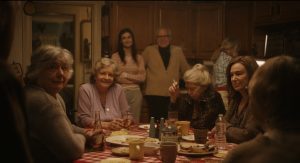
Surrounded by her large extended family, including Aunts Madge (Joyce Van Patten, seated, second from left) and Ina (Phyllis Somerville, seated, second from right), Diane Rhodes (Mary Kay Place, seated, right) finds support for her many endeavors as seen in the insightful new character study, “Diane.” Photo courtesy of IFC Films.
Nevertheless, despite such sincere, heartfelt support, Diane is relentlessly driven in her pursuit of caring for others. But why? That’s what her story gradually reveals. Much of this compulsion seems to be rooted in making up for past mistakes; by doing good, she hopes that she can atone for the errors of her ways, including, somewhat inexplicably, those for which she has already been forgiven. What’s more, with everyone she loves aging and moving ever closer to death, Diane is faced with the shattering of a cherished but naïve longstanding belief that everyone lives forever. This is a painful truth that she quietly hopes to deny by perpetually keeping busy, an effort that ultimately, inevitably and sadly goes for naught with virtually everyone she seeks to help.
How will Diane resolve these issues for herself? That’s what remains to be seen as her story (and those of everyone else around her) plays out. One can only hope that she comes up with answers that satisfy her sensibilities and provide her with the peace of mind that forever seeks to elude her – before life catches up with her.
On its face, “Diane” may seem like a simple tale about daily living, a study of a fairly ordinary character. Most of us probably know a “Diane” of our own, one who continually gives and gives and asks for little in return. It’s a rather common character type, one rooted in reality and not at all that unusual.
So why should we care about her or her story? It’s because this film takes a very deliberate approach in telling it, specifically when it comes to showing how we shape our existence through our thoughts, beliefs and intents, the building blocks of the conscious creation process, the philosophy that maintains we manifest our reality through these metaphysical tools. And writer-director Kent Jones has done an excellent job in demonstrating that for us, an approach that’s part instruction manual, part cautionary tale and part exercise in enlightenment.
As discussed above, Diane’s reluctance to accept help is clearly rooted in her beliefs about herself. She believes she needs to continually do good works for others to make up for past misdeeds. In some ways, it’s easy to understand how she might feel that way, especially given the often-guilt-ridden way that many of her generation were raised. But must we perpetually devote ourselves to the well-being of others at the expense of ourselves out of some sense of obligation, even in instances where we’ve been forgiven for our transgressions? Well, that depends, but, no matter what, that’s where our beliefs come into play. If that’s what we believe we must do, then that’s how our existence will unfold. But we should understand, as the film attempts to make clear, that this is not an intractable absolute; we have other options open to us if we choose to avail ourselves of them. In the end, though, it all depends on the beliefs we choose to embrace, as they’ll set in motion what results. This is the lesson for Diane – and for those of us who share her outlook.
There’s certainly nothing wrong with wanting to be of help to others. In fact, conscious creation maintains that one of its most laudable objectives is to engage in acts of value fulfillment, the concept that maintains we act as our best, truest selves for the benefit of ourselves and those around us, based on our beliefs. Where Diane is concerned, she certainly has the benefit to others part down, but, when it comes to being of benefit to herself, that’s obviously open to debate.
Conscious creation asserts that we manifest our own reality, not the reality of others (even though they may benefit from our efforts in some ways). If we’re make the most of that, then we must be sure that we create circumstances that allow us to operate from a position of personal strength, not only to take care of ourselves, but also to engage in the good works we choose to do for others. Continually giving ourselves over to the needs of others without taking care of ourselves will eventually take a toll on us, making it difficult or impossible to help ourselves or those we seek to serve. This is, in effect, an act of giving away our personal power, something that won’t end up serving anyone in the long run.

Relentlessly driven Samaritan Diane Rhodes (Mary Kay Place, right) receives encouragement to take care of herself from friend and fellow volunteer, Bobbie (Andrea Martin, left), in writer-director Kent Jones’s debut fictional feature, “Diane.” Photo courtesy of IFC Films.
This is an important consideration in learning how to make the most of the time we’ve got. By wisely employing our metaphysical resources, we have an opportunity to maximize our accomplishments, as well as our enjoyment and satisfaction of life. This grows ever more critical the further we travel down the road of life, a notion depicted as a cinematic metaphor throughout the film. It becomes particularly crucial the closer we come to the end; we must ask ourselves, how do we want to spend the time we have left? Where do we want to place our thoughts, beliefs and intents? Do we indeed wish to make the most of things for ourselves and those we seek to help? Or are we going to fritter our time away worried about inconsequentials, such as insignificant details, the opinions of others or ill-placed, self-created feelings of trumped-up guilt? There’s powerful food for thought in this, again both for Diane and those of us who share her perspective.
We must also be mindful about others’ feelings in how we conduct ourselves in these areas. For example, Diane nearly always turns down the assistance others offer her, believing she’s somehow not worthy of it. But does she ever consider that she might be denying others the opportunity to be of service to someone who needs help? One could even go so far as to say that her attitude is a selfish one, because she prevents others from living out their value fulfillment. It’s a consideration we should always keep in mind when such situations arise. We might even learn something from them, namely, that it’s perfectly fine to be the recipient of aid and not always the one to dispense it.

Seeking solace in the woods of Upstate New York helps provide comfort to overburdened caregiver Diane Rhodes (Mary Kay Place) in the insightful new offering, “Diane.” Photo courtesy of IFC Films.
As we undergo such experiences, we may discover aspects of ourselves of which we were unaware. This is essential to our personal evolution, a process directly in line with the conscious creation concept that we’re all in a constant state of becoming. This raises the prospect of living a life that is perpetually revelatory, a theme that permeates Diane’s story on multiple levels and becomes more apparent the further it progresses. It also shines a light on the notion that nothing lasts forever, a difficult truth that Diane must come to terms with, especially when it comes to realizing that, in the end, everybody dies, no matter how hard we may work at trying to prevent it from happening.
This may seem like a lot to take in from a simple story about the life of an aging caregiver. But that’s precisely what makes this such a quietly powerful and poetic film. Rich in insight and symbolism, this little drama elevates a seemingly everyday tale to the height of inspired storytelling. We can thank writer-director Jones for giving us such a touching tale. We can also thank executive producer Martin Scorsese for backing this project, the kind of profound, introspective piece one might expect from the onetime aspiring priest-turned-filmmaker. Mary Kay Place gives an excellent performance in an uncharacteristic dramatic role, backed by a superb cast of supporting players, including many veterans who bring their best game to their roles. Please note, though, that this one may not last long in theaters, so catch it while you have the chance – you won’t be disappointed.

It’s been said that “life is what you make of it.” But how often do we really take the time to examine that statement? What exactly are we making of it? And are we even aware that we truly can do so? We may glibly agree to the idea in passing conversation, but are we really employing the notion in our everyday lives (and, if so, to what end)? Thankfully, “Diane” helps to bring these questions into sharp focus, important considerations for those of us who are closer to the finishing line than the starting point. It’s something we should take to heart and seek to work out while we still have the time and opportunity. It would indeed be a shame to let the clock run out with our work unfinished – and our peace of mind still in limbo.
Copyright © 2019, by Brent Marchant. All rights reserved.
The post ‘Diane’ examines the life unexamined appeared first on Brent Marchant.



